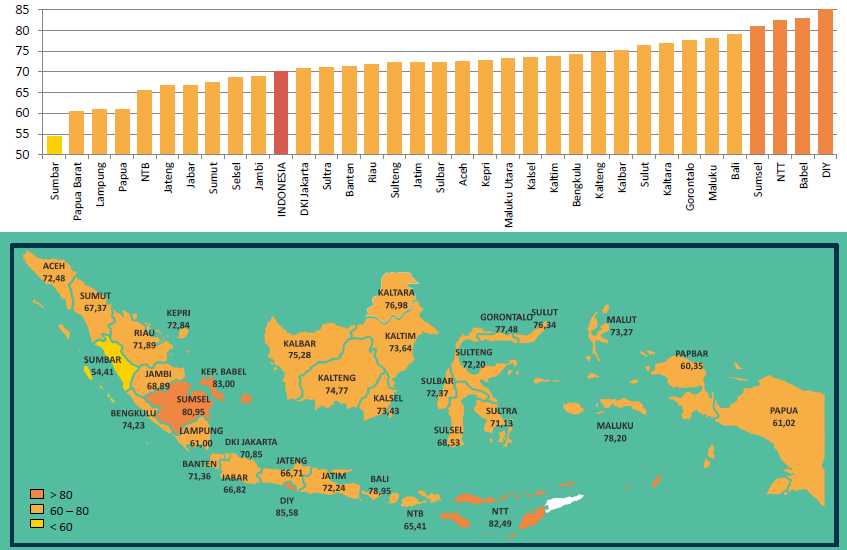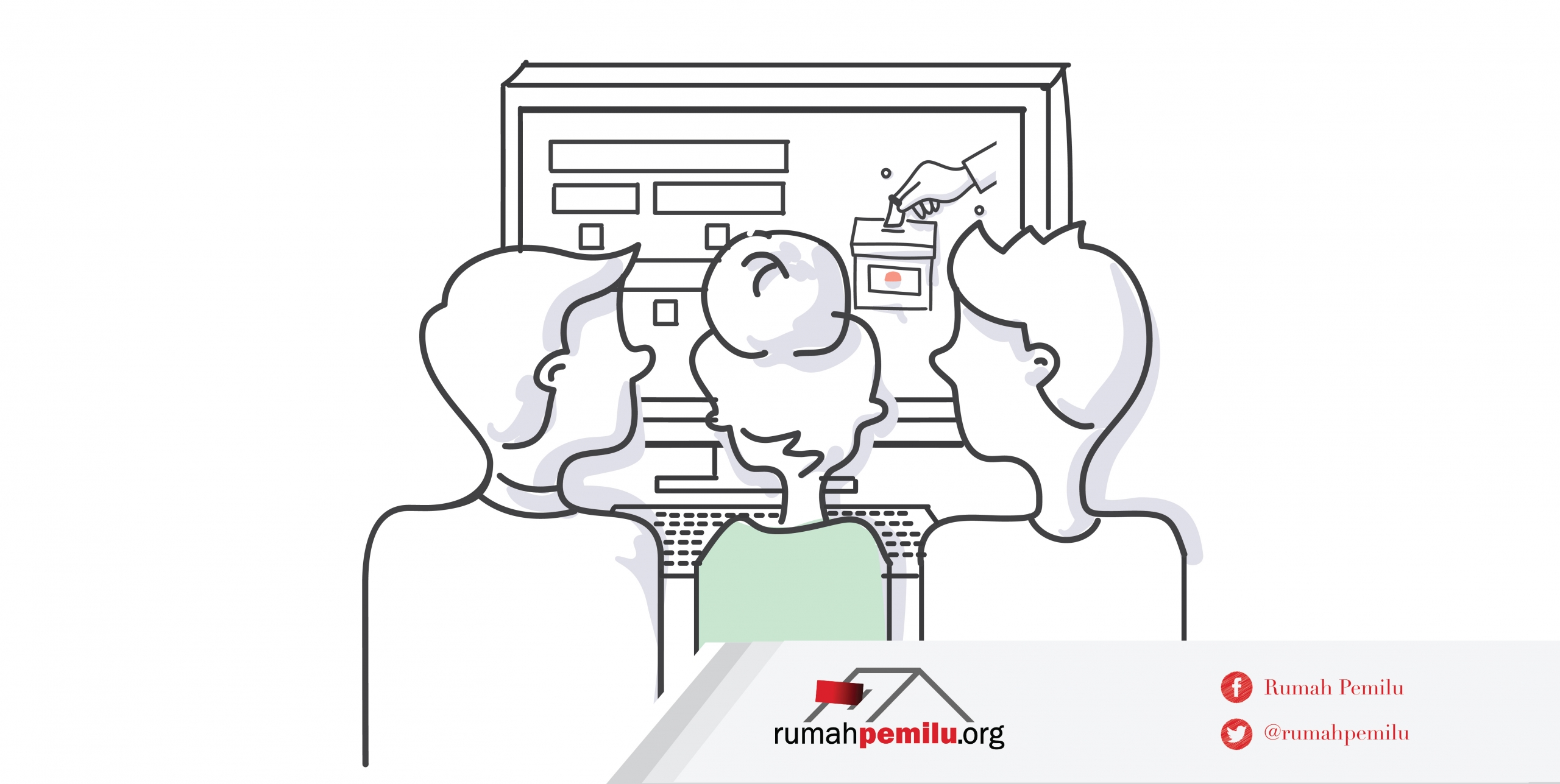According to Indonesia’s Democracy Index (IDI) which was published on Thursday (09/14) by four different state institutions to celebrate the International Day of Democracy on September 15th, democracy in Indonesia is getting worse. The index accumulation of democracy in Indonesia has decreased to 70.9 (out of 100) from 73.63 in 2015. This result is similar with survey conducted by other institution like Freedom House. This decrease is heavily influenced by the worsen civil liberties and poor democratic institutions.
If we compare those results with the result in 2014, we can see that this decrease has become a trend. The index in 2014 was 73.04, while the index in 2015 was 72.82, decreasing 0.22 point. In 2016, the index was 70.09, decreasing 2.73 point from 2014. The accumulation of the decrease since 2014 up until this year is 2.95.
The index 70.9 in 2016 was an average rating from three different aspects: civil liberty, which was rated at 76.45; political rights, 70.11; and democratic institutional index, 62.05. Compared with the same assessment in 2015, the index point in 2016 was a decrease: civil liberty index was decreasing 3.85 points; political rights was decreasing 0.53 points; and democratic institution was decreasing 4.82.
| No. | Indicators | 2015 | 2016 |
| 1 | Threats/actual use of force by state apparatus that hampers the freedom to form association | 86.76 | 82.35 |
| 2 | Threats/actual use of force by civil group that hampers the freedom to form association | 85.85 | 85.85 |
| 3 | Threats/actual use of force by state apparatus that hampers the freedom of speech | 65.32 | 76.47 |
| 4 | Threats/actual use of force by civil group that hampers the freedom of speech | 46.69 | 50.74 |
| 5 | Any written rule that limits the freedom to exercise religious rituals | 80.43 | 81.71 |
| 6 | Any performative action or verbal statement from public official that limits the freedom to exercise religious rituals | 80.79 | 84.19 |
| 7 | Threats/use of force by a group of people in relation with religious teachings | 80.15 | 80.00 |
| 8 | Discriminating written rule on gender, ethnicity, other identity | 83.82 | 81.37 |
| 9 | Any performative action or verbal statement from public official that is discriminating on specific gender, ethnicity, or other identity | 88.97 | 95.59 |
| 10 | Threats/use of force by civil group on gender, ethnicity, or other identity | 91.18 | 87.75 |
The decrease in civil liberties was caused by the decrease in four indicators: threats/actual use of force by state apparatus that hampers the freedom to form association (from 86.76 to 82.35); threats/use of force by a group of people in relation with religious teachings (from 80.15 to 80.00); discriminating written rule on gender, ethnicity, other identity (from 83.82 to 81.37); and on threats/use of force by civil group on gender, ethnicity, or other identity (from 91.18 to 87.75).
| No. | Indicators | 2015 | 2016 |
| 18 | EMBs take side in elections | 98.93 | 98.93 |
| 19 | Vote-counting frauds | 92.03 | 92.03 |
| 20 | Budget allocation for education and health | 57.23 | 60.86 |
| 21 | Local regulations initiated by local parliament | 16.31 | 35.29 |
| 22 | Recommendations from local parliament members to district head | 14.29 | 6.09 |
| 23 | Political recruitment and regeneration in political party | 56.30 | 47.90 |
| 24 | Female political party member who holds important position in the party | 84.17 | 91.84 |
| 25 | Policy made by district head that has been rejected by the State Administrative Court | 62.93 | 67.26 |
| 26 | The availability of information regarding local state budget | 44.85 | 30.88 |
| 27 | Controversial verdict made by state judges | 92.65 | 91.54 |
| 28 | Controversial cancellation of a corruption investigation made by district attorney or police | 91.91 | 91.18 |
Meanwhile, the decrease in democratic institution was caused by decrease in five indicators: recommendations from local parliament members to district head (from 14.29 to 6.09); political recruitment and regeneration in political party (from 56.30 to 47.90); the availability of information regarding local state budget (from 44.85 to 30.88); controversial verdict made by state judges (from 92.65 to 91.54); and controversial cancellation of a corruption investigation made by district attorney or police (from 91.91 to 91.18).
Based on regional mapping, in 2016, there are 19 provinces where the democracy index has increased and 15 provinces where the index has decreased. Three areas with the most increase in 2016 are Maluku (+12.30), North Maluku (+11/74), and Bangka Belitung Island (+10.69). Meanwhile, three areas with the most decrease are Jakarta (-14.47), West Sumatera (-13.05), and East Kalimantan (-7.60).
There are similarities between the result made by this survey with the survey conducted by Freedom House. According to Freedom House’s annual survey, Indonesia’s democracy index started decreasing since 2013 until 2014, and the index getting stagnated onward. The aggregate point for Indonesia is 34.31 (out of 100), sitting at 78th rank out of 198 countries, and categorized as “partly-free country”. In regards with political freedom, the score for Indonesia is 34 out of 40. Meanwhile, in regards with civil liberties, the score is 31 out of 60.
 Rumah Pemilu Indonesia Election Portal
Rumah Pemilu Indonesia Election Portal





